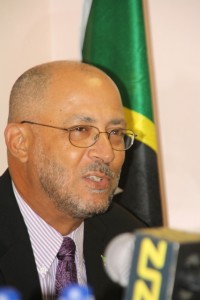BASSETERRE, ST. KITTS, MARCH 25TH 2013 (CUOPM) – St. Kitts and Nevis’ Minister of Tourism and International Transport, Sen. the Hon. Richard “Ricky” Skerritt has underscored the important role that tourism plays in the national economy, pointing out that many of the other sectors such as construction, agriculture, real estate and financial are driven by the demand of tourism related consumers.

Speaking to industry stakeholders at a National Consultation on the Sustainable Tourism Development Strategy, Minister Skerritt called for a revision of the tourism strategy in St. Kitts.
He pointed out a number of achievements St. Kitts and Nevis has made in tourism but said more could be attained if all partners worked together and informed stakeholders that the group was there to review the results of a recent research study conducted by Dr. Auliana Poon, head of Tourism Intelligence International, a travel and tourism consultancy agency.
“Tourism has seen significant growth in recent times. We estimate conservatively that it drives more than a quarter of the national economy today. It is a growing and diverse industry…it engages all sectors of the economy,” he said.
He reminded that Tourism benefitted Kittitians and Nevisians from all walks of life and thus he was glad to see Aloe massagers, vendors, security personnel, law enforcement, hair braiders, fishermen, taxi and tour operators as well as developers, hoteliers and Tourism officials collaborate to formulate the revised tourism strategy that would shape policy for the next five to six years.
Minister Skerritt informed that the most desirable individuals from the visitors in the various market segments must be the target of the new strategy. He said the last study was done in 2006 which helped to identify who the target visitor was then but much had changed in the industry since that time.
“Tourism development and growth in St. Kitts has been unprecedented in importance, scale and economic impact. Much has happened in the world since 2006 including dramatic technological changes which have ushered in the rise of social media; the unprecedented global economic recession that is only now showing a modest recovery was not envisaged in 2006.
“It has forced the travel and tourism industry to wake up to the global competitiveness of the industry and the need for added value for the consumer,” Skerritt revealed, stating that high-end tourism was the way to go while maintaining mass tourism. He noted increases in cruise passenger arrivals, yacht and private vessels visits, private aircraft visits, and airlift arrivals from major international markets such as the US and UK.
Permanent Secretary in the Ministry of Tourism Patricia Martin described the consultation as a vital part of the process of developing a national tourism sector strategy. The consultation, she said, allowed the critical industry stakeholders an opportunity to discuss various issues that would help formulate the strategy.
“The last study was done in 2006 and given the significant strides being made in the sector it was felt this is an opportune time to formulate a new strategy which would provide direction for tourism development over the next five years,” she said.
She said the research conducted by Dr. Poon involved suggestions on how to improve the tourism product and grow tourism and included issues such as human resource development, the environment and local culture.
Dr. Poon informed of the importance of re-invention of one’s tourism product. She said the industry had moved away from products and had become “pro-people.”
“If we do not re-invent ourselves we will die…The industry has moved away from products and hotel beds to experience; tourists want to engage the people. More than half of the stakeholders in the study say the people are the most assets, followed by natural resources and culture,” she said.
Dr. Poon engaged the attendees in interactive analysis and visioning exercises over the course of the day and concluded with action planning sessions.

